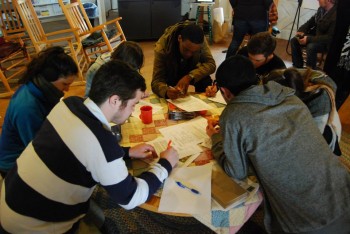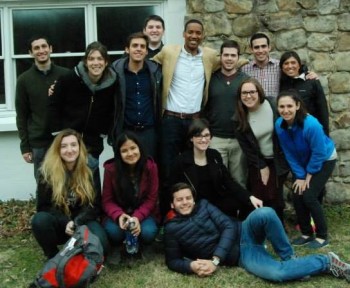Advanced Studies in Social Enterprise Capstone to Tennessee
By Sydney Banks
On March 7th, fourteen Northeastern students enrolled in ENTR4506, “Advanced Studies in Social Entrepreneurship,” traveled to Tennessee and Kentucky to take part in a week-long field visit to social enterprises and social entrepreneurial communities in both urban Nashville and rural Appalachia.
In the past, this capstone course has led students to developing countries, including Jamaica and Nicaragua, in order to study the role of social enterprises in alleviating poverty. This year, however, Professor Sara Minard based the curriculum on scaling impacts of social innovations focused on the food systems value chain in the U.S. While much of the course focused on food system-related issues in urban settings, particularly in the Greater Boston Area, this field study allowed students to see the pervasive food insecurity issues that exist both in urban areas like Nashville and in more rural parts of the U.S., as well as how local communities and organizations are creatively using local organizing strategies and social enterprise principles to address these issues.

SEI Capstone students at work in Appalachia
Throughout the week, the group visited and interacted with a wide range of individuals, organizations, and communities that sought to address various social issues through the creation of innovative and scalable solutions. These organizations included Thistle Farms in Nashville, TN, Grow Appalachia in Berea, KY, and Clearfork Community Institute in Eagan, TN, among many others. The week culminated in a two-day training in participatory design thinking for community development, followed by a raucous night of square dancing at the Highlander Research Center in Newmarket, TN, one of the nation’s leading centers for civil rights and social justice.
Some of them shared some reflections on the trip:
“I recently got back from a trip to Appalachia with my advanced social enterprise class studying scaling opportunities for innovations in the food value chain, and it proved to be one of the most rewarding weeks of my life. In seven short days we broke down preconceived notions of the south and of Appalachia, were inspired by people doing amazing things with relatively few resources and a lot of love, and got to the very core of what it means to be human.” -Douglas Shaughnessy
“Seeing communities within my own country, who were struggling with things that I take for granted- like clean water, really opened my eyes to the opportunities for social entrepreneurship to make an impact here in the United States. People make generalizations about this country, thinking nothing can possibly be wrong in our developed nation, while yet there are places in which conditions are akin to those often found in the developing world. Places like, Appalachia. I realized the first part to solving issues like these is to spread the knowledge of the problem. People can no longer turn a blind eye to the les developed parts of our nation. We need to come together, like many of these communities have, to make a change and improve the lives of all citizens of the U.S.” – Nina Waskiewicz

SEI Capstone students
After better understanding the successes and impacts of each venture, the class reflected upon which practices of each of these organizations were replicable and how they might be applied to future innovations within the food system. Ultimately the trip allowed students to refine their final deliverables for the course while also equipping them with tools, approaches and knowledge that could ultimately be used to create effective and sustainable systems designed to address social issues in the real world.


